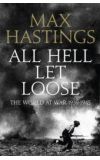
17 Oct 2011 09:00:55
It's the significance of the individual witness that powers Max Hastings's new history of the second world war. He has written several books on the conflict, and his sometimes revisionist judgments on its conduct are well known. What is new and interesting here is the reliance on people who simply set out their own observations. The historical approach that fleshes out the larger narrative with worm's-eye viewpoints has grown in popularity recently. David Kynaston's excellent series about postwar Britain humanises a large social shift with individual voices of, sometimes, surreal inconsequence. The scale of suffering in the war is so colossal that deaths become, numbingly, mere statistics. About one German in 12 died, and one in four soldiers from the Japanese and Russian armies. If you want to know what death on that scale feels like, consider that around one American in 100,000 died on 9/11. Hastings's plan is to revitalise the sense of suffering and bravery by exploiting first-person accounts from every theatre of the vast war.
Some of the witnesses come from a more extensive selection than others, or at any rate are more extensively explored. The Pacific campaign is given many more witnesses from the Allied side than from the Japanese. Perhaps the nameless Japanese soldier who wrote, at Kohima, of the "bodies of our comrades … rainsodden and giving off a stench of decomposition" was a relatively rare reporter. But it is odd not to include some of the many testimonies of the survivors of Hiroshima to balance the detailed and striking witnesses of the London blitz.
Otherwise, Hastings has quarried the written accounts of active and passive participants in the war widely and, for the most part, rewardingly. They are of most interest when they observe seemingly trivial details. A Pravda correspondent in Voronezh was struck that the women who now policed the city were more effective in directing traffic, but "used their whistles too much". Inevitably, some of these accounts are harrowing in their specific detail, or simply grotesque. The incredible tale of the two survivors of the coal-carrier Anglo-Saxon, who drifted in an open boat for 2,275 miles before striking the Bahamas, is unusual only because they survived. The prize for grotesque horror is taken by the Italian soldier who turned up at a field hospital having had his balls shot off. Out of his pockets he produced "the blackish testicles mixed with biscuit crumbs, asking whether they could be sewn back on".
The passage of time and the enormous shift of culture between now and then give many of these stories a remote quality. Some of the Russian accounts are sharply seen and described, such as the officer who wrote that, by day, Stalingrad "is a vast furnace lit by the reflection of the flames. And when night arrives – one of those scorching, howling, bleeding nights – the dogs plunge into the Volga and swim desperately for the other bank." Others, including many German correspondents, stick rigidly to the public ideology in their private comments, whether through fear or conviction. English-speaking witnesses can seem as remote, such as the Time correspondent Robert Sherrod gamely contending of an enemy soldier trying to kill himself on the battlefield that, "like all Japs, he took a lot of killing".
But sometimes a voice emerges that just sounds immensely human. There is the boyish Australian hiding on the occupied island of Guadalcanal who, seeing 19,000 American troops come ashore, wrote in his diary: "Wizard!!! – Caloo, Callay, Oh! What a day!" Or the understandably moany or terrified soldiers who, demonstrating Wellington's dictum (quoted by Hastings) that "not every man who wears a military uniform is a hero", hurry to share their misery. "I wonder if it would do any good Mum if you wrote to the Admiralty and asked them if there was no chance of getting a shore job at Rosyth." (It did no good: the reluctant forerunner of Private Pike who wrote this went down with his ship in 1941.)
Hastings is, rightly, assured in his moral judgments, making it plain what we should think of Churchill's culpability for the Bengal famine. He remarked, as millions were dying, that "there is no reason why all parts of the British empire should not feel the pinch in the same way as the Mother Country has done"; one of Zainul Abedin's masterly china-ink sketches of the suffering beggars, some of the most famous works of Indian art, is reproduced here as a silent witness for the prosecution. There is, too, the grotesque spectacle of Éamon de Valera putting on a morning coat to pay a formal visit of condolence to the German embassy in Dublin on the death of Hitler. There may be a couple of slips here – it was not the German Philharmonic Orchestra but the Berlin Philharmonic Orchestra that gave a final concert on 12 April 1945 with the Russians at the gate, and most people agree that the programme ended with Bruckner's fourth symphony, not, as Hastings says, the eighth. Still, he avoids the fanciful story that the Hitler Youth stood at the exits at the close of the concert with baskets of cyanide pills.
On the whole, this is a confident telling of an extremely complex story. In the balance between the large narrative and the individual experience, it is good to have accounts of overlooked episodes which may be remembered only in the cultures they affected – the siege of Leningrad is familiar ground, the Bengal famine less so. If war affects and changes continents, it happens in the first instance to one person, and then another, and another. This book goes some way to registering the second of those heartbreaking truths.

